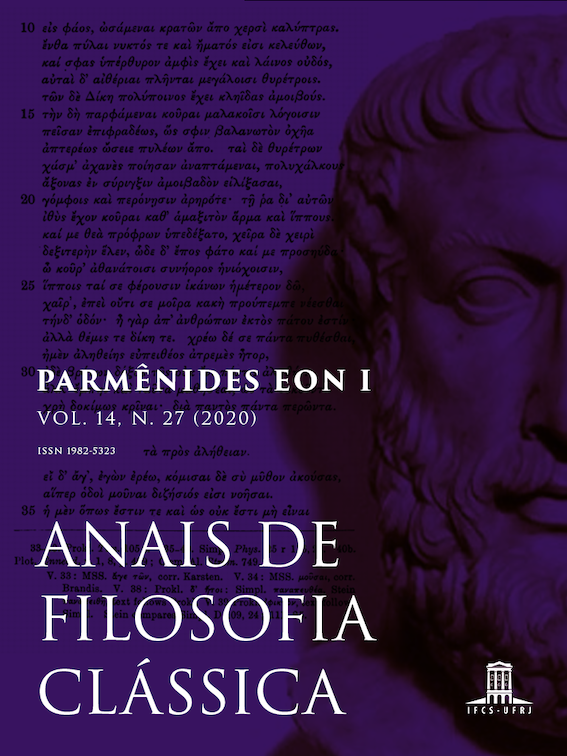Doxa, Diakosmêsis and Being in Parmenides’ Poem
DOI:
https://doi.org/10.47661/afcl.v14i27.39061Palabras clave:
Parmênides, Doxa, Cosmologia, Doxografia, SimplícioResumen
The modern edition of Parmenides’ poem (from Fülleborn’s 1795 work onwards) consolidated the well-known dichotomical scheme according to which its fragments are established and understood, i. e., attributing them to either one of two main “parts”, following the Proem, that is, to Truth (Alêtheia) or Opinion (Doxa). A careful review of the doxographical testimonies reveals, however, sufficient indications to cast doubts over this well-accepted representation. In this paper, we would like to analyze some of these testimonials – particularly those found in Simplicius – aiming to show the evidence for an important distinction between what the Ancients called a section “On Opinion” (ta pros doxan) and the parmenidean Cosmogony properly. We shall see that this hypothesis implies a “reductionist” view of the Doxa, limited to verses 53-61 of fragment 8, in addition to the four verses of fragment 9. The cosmogonical account, moreover, as we would like to show, should not be simply understood as any collection of “mortal opinions” – in the sense of their devaluation in the first part of the poem (cf. B1,30; B6,4-9; B7,3-5) – but instead as importing epistemological features into the description of the origins of the present state of the universe. Finally, we extract from this picture some consequences for the understanding of the role of the argument on Being and the limits of Parmenidean “ontology”.Descargas
Citas
Brague, R. “La vraisemblance du faux (Parménide, fr. I, 31-32).” Études sur Parménide: Problèmes d’interprétation. Vol. 2. 2 vols. Vrin, 1987.
Bredlow, Luis Andrés. “Cosmología, cosmogonía y teogonía en el poema de Parménides.” Emerita 78.2 (2010): 275–297. Web. 9 Aug. 2014.
Conte, Bruno. “A poética de Parmênides e sua nova imagem de mundo.” Hypnos 37 (2016): 225–251.
Cordero, Nestor-Luis. “L’histoire du text de Parménide.” Études sur Parménide. Ed. P. Aubenque. Volume II: Problémes d’interprétation. Paris: Vrin, 1987. 3–24.
Cordero, Nestor-Luis. “The ‘Doxa of Parmenides’ Dismantled.” Ancient Philosophy 30.2 (2010): 231–246.
Cornford, F. M. “Parmenides’ Two Ways.” The Classical Quarterly 27 (1933): 97–111.
Curd, P. “Deception and Belief in Parmenides’ Doxa.” Apeiron 25.2 (1992): 109–134.
Dehon, P. “Les recomendations de la déesse. Parménide, fr. 1.28-32.” Revue de Philosophie Ancienne 6.2 (1988): 271–289.
Denniston, John Dewar. The Greek Particles. 2nd ed. London: Oxford University Press, 1954.
Diels, Hermann. Doxographi Graeci. Berlin: Reimer, 1879.
Diels, Hermann. “Über die ältesten Philosophieschulen der Griechen.” Philosophische Aufsätze: Eduard Zeller zu seinem fünfzigjährigen Doctor-Jubiläum gewidmet. Leipzig: Pues, 1887.
Diller, H. “Der vorphilosophische Gebrauch von κόσμος und κοσμεῖν.” Festschrift Bruno Snell. München: C. H. Beck, 1956. 47–60.
Falus, R. “Parmenides-Interpretationen.” Acta Antiqua Academiae Scientiarum Hungaricae 8 (1960): 267–294.
Finkelberg, Aryeh. “Being, Truth and Opinion in Parmenides.” Archiv für Geschichte der Philosophie 81.3 (1999): 233–248.
Finkelberg, Aryeh. “On the History of the Greek Κόσμος.” Harvard Studies in Classical Philology 98 (1998): 103–136.
Fülleborn, G. G. “Fragmente Des Parmenides. Neu Gesammelt, Übersetz Und Erläutert.” Beyträge Zur Geschichte Der Philosophie. Ed. G. G. Fülleborn. VI. Züllichau/Freistadt: Frommannische Buchhandlung, 1795. 1–102.
Guthrie, W. K. C. A History of Greek Philosophy: The Presocratic Tradition from Parmenides to Democritus. Vol. 2. Cambridge University Press: Cambridge, 1965.
Hershbell, Jackson P. “Parmenides’ Way of Truth and B16.” Apeiron 4.2 (1970): 1–23.
Kahn, Charles. Anaximander and the Origins of Greek Cosmology. New York: Columbia University Press, 1960.
Kurfess, Christopher J. “Restoring Parmenides’ Poem: Essays Toward a New Arrangement of the Fragments Based on a Reassessment of the Original Sources.” Jan. 2012: n. pag.
Laks, Andre. “‘The More and the Full’. on the Reconstruction of Parmenides’ Theory of Sensation in Theophrastus, de Sensibus, 3–4.” 8 (1990): 1–18.
Long, A. A. “The Principles of Parmenides’ Cosmogony.” Phronesis 8.2 (1963): 90–107.
Long, A. A. “The Scope of Greek Philosophy.” The Cambridge Companion to Early Greek Philosophy. Ed. A. A. Long. Cambridge: Cambridge University Press, 1999. 1–21.
Marcinkowska-Rosól, Maria. “Zur Syntax von Parmenides Fr. 1.31-32.” Hermes 135.2 (2007): 134–148.
Mullach, G. A., ed. “Parmenidis carminum reliquiae.” Fragmenta Philosophorum Graecorum. Vol. 1. 2 vols. Paris: Didot, 1860. 114–130. Poeseos Philosophiquae.
Pulpito, Massimo. “Parmenides and the Forms.” Parmenides, Venerable and Awesome (Plato, Theaetetus 183e):Proceedings of the International Symposium. Ed. N.-L. Cordero. Las Vegas/Zurich/Athens: Parmenides, 2011. 191–212.
Rossetti, Livio. “La polumathia di Parmenide.” Khôra (2015): 193–216.
Schwabl, H. “Sein und Doxa bei Parmenides.” Um die Begriffswelt der Vorsokratiker. Ed. H.-G. Gadamer. Darmstadt: Wissenschaftliche Buchgesellschaft, 1968 [1953].
Thanassas, Panagiotis. Parmenides, Cosmos, and Being: A Philosophical Interpretation. Milwaukee: Marquette Univ. Press, 2007.
Verdenius, W. J. Parmenides, Some Comments on His Poem. Amsterdam: A. M. Hakkert, 1964 [1942].
Zeller, E. Die Philiosophie der Griechen in ihrer geschichtlichen Entwicklung. Vol. 1. Leipzig, 1869.


